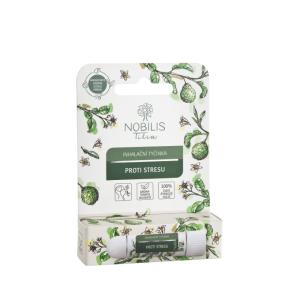
How to Stop Watery Diarrhea and Return to Normal Life

How to Deal with Watery Diarrhea Gently and Naturally
Everyone has experienced it – sudden stomach cramps, a rushed trip to the bathroom, and then the unpleasant surprise of loose, watery stools. Watery diarrhea can come unexpectedly and seriously complicate your day. Whether it's due to a dietary mistake, stress, a virus, or bacterial infection, most people have a single question in mind: How to stop watery diarrhea as quickly and gently as possible?
Although it's a common health issue, it shouldn't be underestimated. During diarrhea, the body loses not only water but also essential minerals and electrolytes needed for proper functioning. That's why it's important to approach this situation responsibly and with respect for the body's natural processes.
What Exactly Happens During Diarrhea?
Before we look at ways to stop watery diarrhea, it's worth understanding what's happening in the body. Diarrhea is a defense mechanism by which the body tries to quickly rid itself of unwanted substances – whether they are bacteria, viruses, or toxins. The accelerated movement of the intestines prevents the absorption of nutrients and water, leading to loose stools.
Diarrhea is often accompanied by other symptoms – bloating, abdominal pain, nausea, or even fever. In some cases, it resolves on its own within a day or two. However, if it lasts longer or signs of dehydration appear (dry mouth, dark urine, weakness), it's necessary to intervene.
How to Handle Watery Diarrhea Naturally and Wisely
A common mistake people make is trying to stop diarrhea immediately at all costs. Pharmaceutical preparations can slow down bowel activity, but they can also prevent the body from eliminating the infection. That's why it's sensible to prefer gentler, natural methods.
One of the most effective strategies is supporting hydration. The body loses a huge amount of fluids during diarrhea, which must be replenished as quickly as possible. However, water alone isn't enough – it's important to also supply minerals like sodium, potassium, and magnesium. Rehydration solutions, root vegetable broth, or homemade electrolyte drinks (such as water with honey, salt, and lemon) can help.
Diet also plays a significant role. Contrary to myths, it's not necessary to stop eating completely – rather, the diet should be adjusted so it doesn't burden the digestive system. Ideal foods are soft, non-bloating, and easily digestible: rice, bananas, boiled carrots, applesauce, or crackers. Dairy products or fatty foods should be avoided for a few days.
In addition, herbal support can be utilized, which our grandmothers knew well. For example, peppermint helps calm digestion and relieve cramps, chamomile has anti-inflammatory effects, and dried blueberries have a mild astringent effect. Herbal teas can thus be a pleasant addition to fluids and an effective means of relief.
Natural Aids Against Diarrhea – What Really Works?
While some natural methods serve mainly as supportive help, there are also those that have a truly proven impact on the duration and intensity of diarrheal disease. Among the most commonly recommended are probiotics, which are especially appreciated after finishing antibiotics or during travels when the body encounters unknown bacteria – their main advantage is that, unlike other remedies, they can be taken preventively and help restore intestinal microflora balance.
Another helper is activated charcoal, which works by binding to toxic substances and harmful bacteria – it can quickly alleviate unpleasant symptoms. However, it's not ideal for long-term use, as it can affect the absorption of some medications. Then there's the slightly lesser-known but widely tried apple cider vinegar – when added by a teaspoon to a glass of water, it can support digestion and ease digestive discomfort due to its natural antibacterial properties.
It is essential to always remember that even with natural remedies, what helps one person may not necessarily work for another – bodily reactions are individual, and sometimes it's best to combine multiple approaches. Ultimately, long-term prevention plays a significant role, not just treating current issues.
On the other hand, beware of miraculous "folk remedies" that lack evidence. For example, drinking strong black tea with sugar might provide temporary relief but can also irritate the stomach.
When Is It Time to See a Doctor?
Watery diarrhea usually resolves on its own soon, but there are cases when it's better not to wait and see a doctor – especially if it involves small children, the elderly, or people with long-term health issues, for whom dehydration can pose a serious risk. Pay special attention if the diarrhea lasts more than three days, if there is blood in the stool, if high fevers, severe abdominal pain, or signs of dehydration occur, such as weakness, low urine output, or confusion.
In such cases, it may be a bacterial infection that cannot be managed with just home care. Sometimes it's also necessary to test a stool sample to determine the exact cause.
How to Avoid Diarrhea? Prevention is Key
Perhaps even more important than the question how to stop diarrhea is knowing how to prevent it. Digestive problems are often related to diet, lifestyle, and overall resistance of the organism. Surprisingly simple principles that work include:
- Maintain hygiene – washing hands thoroughly after using the toilet and before eating is fundamental.
- Caution when traveling – in high-risk countries, drink only bottled water, avoid ice and raw foods.
- Healthy intestinal flora – regular intake of fiber, fermented foods, and probiotics contributes to stronger digestion.
- Avoid stress – nervousness and tension directly affect bowel activity. As the old saying goes: "All diseases begin in the gut."
Try our natural products
An example is the story of Michaela, a mother of two young children, who fell ill with severe diarrhea after returning from a vacation in Egypt. Instead of immediately turning to medication, she started a rehydration regimen with homemade broth, took activated charcoal, and drank peppermint tea. After two days, her condition began to improve, and within a week, she was back to full strength. "Today I know that rather than stopping everything quickly, it's better to give the body space to cleanse itself, while also helping it with the right food and drink," she says.
In today's world, where it's easy to reach for a pill, it's important not to forget natural and gentle ways to take care of oneself. Watery diarrhea may not be pleasant, but with the right approach, its course can be alleviated, and the body can be returned to balance more quickly. Rational approaches, as well as a return to proven traditions and natural methods that our ancestors used for generations, can help with this.


